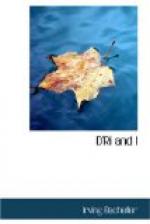He was a great whip, that man David Parish, who had built a big mansion at Ogdensburg and owned so much of the north country those days. He was a gentleman when the founders of the proud families of to-day were dickering in small merchandise. Indeed, one might look in vain for such an establishment as his north of Virginia. This side the Atlantic there was no stable of horses to be compared with that he had—splendid English thoroughbreds, the blood of which is now in every great family of American horses. And, my faith! he did love to put them over the road. He went tearing up hill and down at a swift gallop, and the roads were none too smooth in that early day. Before leaving home he had sent relays ahead to await his coming every fifteen miles of the journey: he always did that if he had far to go. This time he had posted them clear to the Harbor. The teams were quickly shifted; then we were off again with a crack of the whip and a toot of the long horn. He held up in the swamps, but where footing was fair, the high-mettled horses had their heads and little need of urging. We halted at an inn for a sip of something and a bite to eat.
“Parish,” said the general, rising on stiffened legs, “I like your company and I like your wine, but your driving is a punishment.”
D’ri was worn out with lack of sleep and rest, but he had hung doggedly to his saddle.
“How do you feel?” I asked him as we drew up on each side of the coach.
“Split t’ the collar,” said he, soberly, as he rested an elbow on his pommel.
We got to headquarters at five, and turned over the prisoners. We had never a warmer welcome than that of the colonel.
“I congratulate you both,” he said as he brought the rum-bottle after we had made our report. “You’ve got more fight in you than a wolverene. Down with your rum and off to your beds, and report here at reveille. I have a tough job for you to-morrow.”
XI
It was, indeed, tougher business than we had yet known—a dash into the enemy’s country, where my poor head was in excellent demand. D’ri and I were to cross the lake with a band of raiders, a troop of forty, under my command. We were to rescue some prisoners in a lockup on the other side. They were to be shot in the morning, and our mission therefore admitted of no delay. Our horses had been put aboard a brig at midnight, and soon after the noon mess we dropped down the lake, going into a deep, wooded cove south of the Grenadier Island. There we lay waiting for nightfall. A big wind was howling over the woods at sunset, and the dark came on its wings an hour ahead of time. The night was black and the lake noisy when we got under way, bound for a flatboat ferry. Our skipper, it turned out, had little knowledge of those waters. He had shortened sail, and said he was not afraid of the weather. The wind, out of the southeast,




